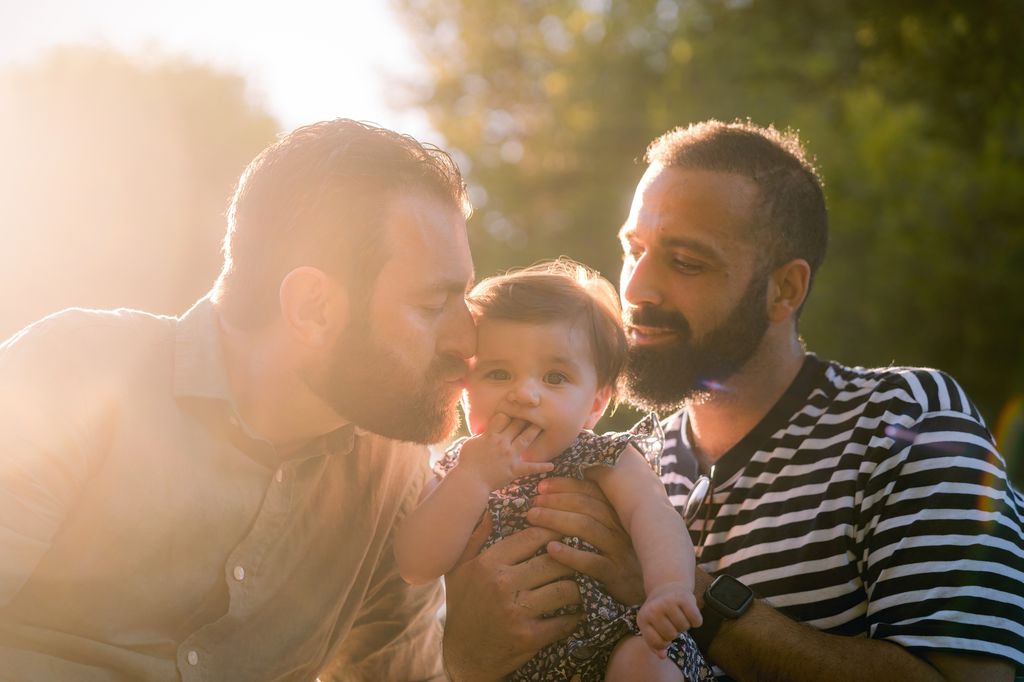Becoming a parent changes A LOT, and it can be a testing time for even the strongest relationships. From managing the seemingly endless needs of a newborn through to agreeing on the approach for troublesome teen years, having a dependant can really test your bond. Ellie Baker is a couples coach and founder of Coupld, a relationship course for couples preparing for parenthood, and she’s on hand to provide her ultimate advice for babyproofing your relationship. Catch Ellie speaking at The Baby Show NEC Birmingham from 9-11 May.
The strain on your relationship
Speaking from experience, Ellie explains that becoming a parent can result in “relationship challenges that simply didn’t exist beforehand”. Ellie continues: “It is incredibly common for a relationship to feel the strain in parenthood and for good reason. Unfortunately, this topic is barely addressed in antenatal classes. I’d love to normalise the challenges so that soon-to-be-parents can feel less thrown off course if it happens to them.”
Top tips to babyproof your relationship:
Knowing when to talk (and when not to)!
“The context of when we have our conversations is so often overlooked, yet it has such a big impact on how well it’ll go,” explains Ellie. “I can promise you that if my husband wants to talk to me about the mess I’ve left around the house, just before we get into bed, after a long stressful day where we’ve barely spoken other than admin and logistics, I’ll probably be grumpy, short and defensive. But, if he asked to go for a walk together the next morning, when I’m well rested, we’re out of the house and we’re feeling connected, he’d be speaking to a completely different woman.
“My first tip is to draw three columns, worse, neutral and better and fill in as much context as you can to answer the question ‘When do we have our best conversations?’. Compare your answers and use this information to set yourselves up for success. Pick your moments, and if you find yourself debating sleep training at 3 am, you can refer back to this exercise and restart the conversation when the timing’s right.
2. Come up with a scoring system
“Communication can be challenging at the best of times, but add in sleepless nights, hormones and a hundred and one other things to think about, and it becomes a lot harder. Finding ways to simplify how you can convey what you mean, but without using many words to do so, is a useful tool in parenthood and whenever else emotion might be high and cognition low! I love scoring systems for exactly this purpose.”
Elaborating on the scoring systems, Ellie explains: “It could be a way to check in with an aspect of your relationship, for example, how appreciated you’re feeling. It could be a traffic light, a percentage, a football score – the options are endless. Just make sure you’re both clear on what the scores mean. For inspiration, you can search for the one Brene Brown uses with her husband!”
3. Get a conflict repair strategy
Normalising post-baby arguments, Ellie says: “Let’s accept that conflict is pretty much inevitable.” So what can we do? “Instead of trying to avoid conflict, let’s embrace it and get good at repairing afterwards too,” advises Ellie. “Write your answers separately to the questions, ‘What provokes me in conflict?’ ‘What helps me during conflict?’, ‘What makes repair harder?’ and ‘What do I need most when we repair?’.
“Discuss your answers together and come up with two things to avoid and two things to try to do during both conflicts and repair conversations. It could be things like avoiding raising your voice or storming off, needing validation, a hug or time by yourself to think before talking. This is an exercise in raising your self-awareness and your understanding of your partner – but doing it proactively as a team!”
4. Identifying rest
“One of the harder transitions of going from a couple to a family is the reduction in time you have to yourself (and with one another),” acknowledges Ellie.
“It’s probably unrealistic, especially initially, to imagine carving out long chunks of time to spend alone or with your partner, so what small everyday restorative habits can you identify and share with your partner? These are the quick, family-friendly activities that you’d find time for regardless, but you can now protect and encourage one another to make more of them.”
What small everyday restorative habits can you identify and share with your partner?
Ellie gives personal examples: “Mine is taking a shower! My husband’s is reading the news on the toilet. Prior to identifying these moments of rest, we used to find each other’s habits irritating – how could he spend so long on the loo?! But once we realised these were important opportunities to get a quick break and restore, we started supporting one another to get them. It was a game-changing moment for us in the first few months of parenting.”
5. A nighttime care plan
“I’m going to state the obvious here – but maximising sleep as much as you can is a great idea in parenthood! Although much easier said than done, of course,” says Ellie. “Getting on the same page about how you’ll do this as a team is really important. One thorny topic between couples that quickly leads to resentment is how they handle overnight care. So, I suggest coming up with a plan before the baby arrives. You’ll likely have to adjust once you meet your baby, but having some ideas for plan A, B and C will help ease tension between the two of you.”
Parenthood manages to shine a light on the little cracks and make them wider
6. Establishing (and adjusting) your standards
Ellie also advises on how to handle the tricky topic of tasks: “Another area which can very quickly lead to feelings of resentment, is how you handle the new workload that a little baby brings with them.” She adds: “Even if you feel good about how you share household responsibilities now, parenthood manages to shine a light on the little cracks and make them wider.”
“What you really need to do is have a conversation about your expectations and standards when it comes to chores and responsibilities. It’s ineffective to hand off a task, e.g. preparing evening meals, if one of you expects nutritious home-cooked meals each night and the other is happy with a sandwich. The task will still be a source of contention. My suggestion when you’re about to have a baby is to get clear on what your agreed upon standards are around the home, e.g. cleanliness and tidiness, etc.” However, she does add a big caveat: “Force yourselves to adjust them to the absolute minimum! What can you get away with as a baseline so that you can free up time bonding together instead? The dishes can wait.”
7. Think about quality time, now
“Every relationship needs nurturing in order to stop distance and strain from pulling it apart,” asserts Ellie. “But it’s unproductive to make parents with young children feel like they ‘should’ be going out for weekly date nights. Finding the time (or money) means it isn’t possible. Instead, get creative about maximising what time you can find together…
“Carve out some time to sit down together and brainstorm a whole host of things you could do together in the two-hour window of free time each evening and keep the list handy. It’s a fun conversation to have in and of itself and it’ll help you to make the most of your limited quality time when you get it.”
8. Get relationship-rich
“I like to use the analogy of the intimacy bank account,” explains Ellie. Sounds interesting, right? She elaborates on the concept: “Imagine you have £1 million in your bank account. If you were to withdraw £50 – you’d barely notice! But if you only have £100 in there, withdrawing that same £50 is going to be extremely painful. You can think of your relationship in the same way. Every time you make that extra little bit of effort, do the thoughtful thing, carve out time for them, express your affection and appreciation – you’re topping up your intimacy bank account.”
We focus so much on making deposits into our relationships with our children, we might only give little scraps to the account with our partner
She continues: “If it’s at a healthy balance, conflict and disconnect won’t be too painful. The trouble is that during the early years of parenthood, we focus so much on making deposits into our relationships with our children, we might only give little scraps to the account with our partner. Our balance can feel dangerously low, quite constantly. Topped up only sporadically on a date night or a sacred weekend away! This means every little withdrawal is felt, far more acutely, too. The remedy isn’t more of the big gestures, but very steadily saving over time with all the little acts of love, generosity and kindness. Quite simply, asking yourself (or them!), ‘What can I do to make their day better?’ and doing one positive thing each day to keep the boat afloat and on course.”
Read the full article here










